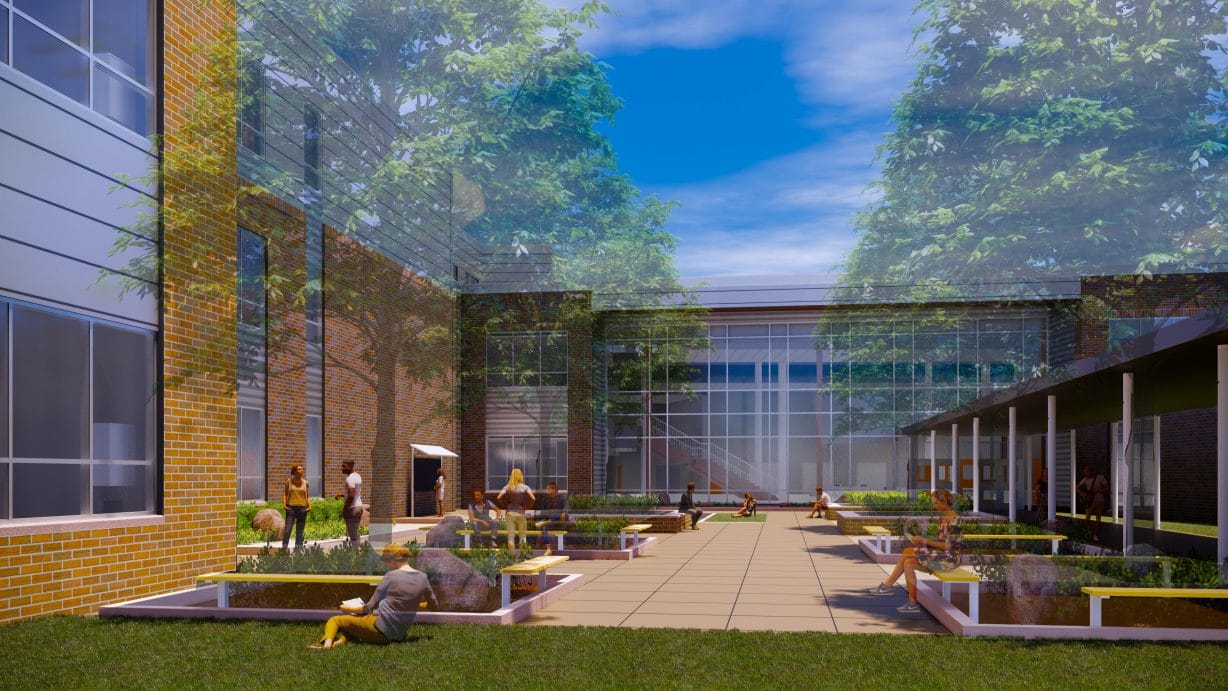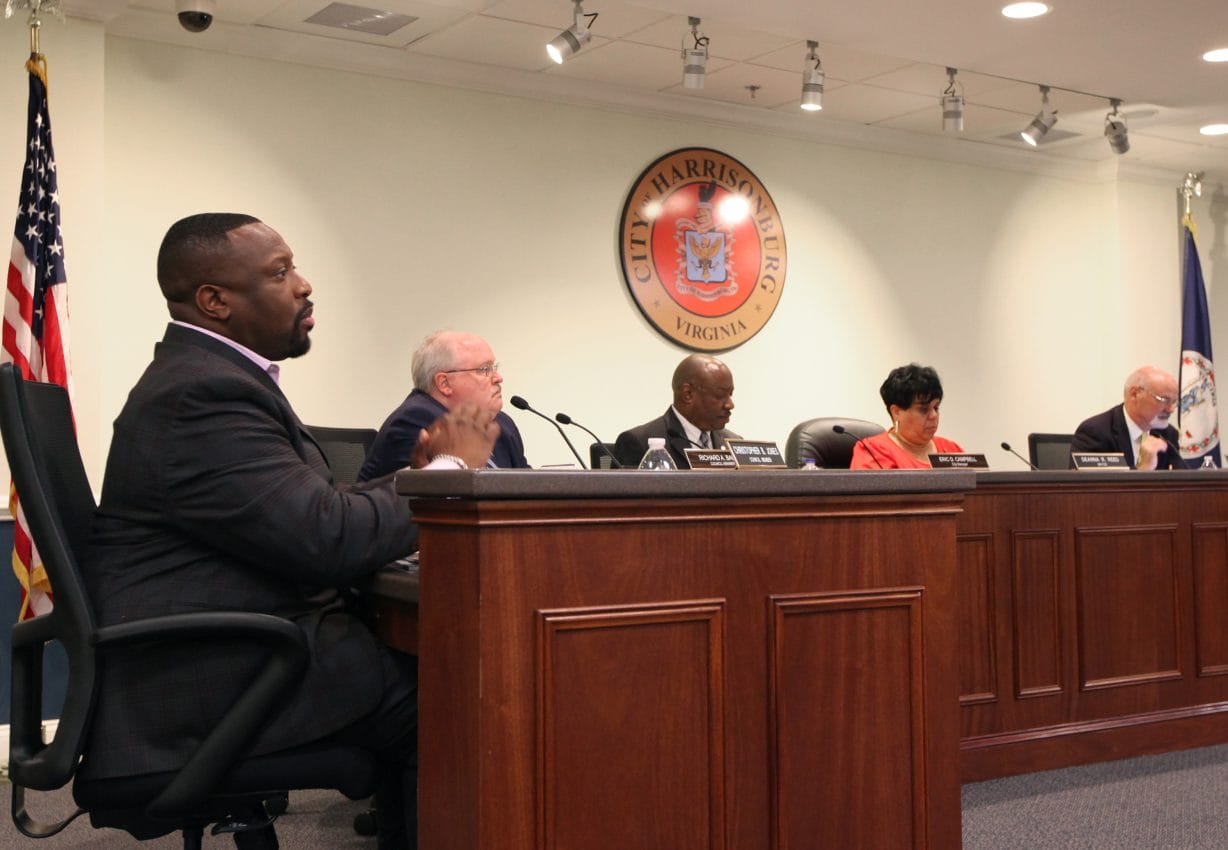
By Randi B. Hagi, assistant editor
The new high school’s plans are headed for more revisions — potentially delaying construction of many athletics facilities — as a result of Tuesday’s city council meeting when city officials expressed their concerns about the building’s $87.2 million cost.
In an effort to avoid a clash between the council and school board, which had endorsed the new school’s design at its Nov. 5 meeting, school administrators drafted an alternative plan to build the school in two phases. This came after a liaison committee meeting with city staff and government representatives on Friday.
“We want to work together, we don’t want this to be any sort of adversarial relationship,” Michael Richards, superintendent of the school district, said in Tuesday’s meeting. “We heard concerns from the liaison committee, from the council’s side, about the tax rate.”
City Manager Eric Campbell presented the council with projections of how the new school project could raise real estate taxes in the city. On the high end, he explained, the tax rate could increase by 13 cents, to a total of 99 cents per $100 of assessed value. That would mean owners of a house assessed at $200,000 would pay an annual real estate tax of $1,980 to the city — up from $1,720 at the current rate.
The tax increase would help the city keep up with the cost of debt payments for project.
“We heard concerns, probably even more so concerns about debt capacity. And so we listened,” Richard said.
As a result, the potential compromise would allow the new high school to be built and functional for the fall of 2022, but it would not include the auxiliary gym, football stadium and softball and baseball fields that are in the design, which the school board accepted Nov. 5. Those athletic fields would be built during a second phase sometime in the future.
Community members can weigh in on the proposed alternative at a special public meeting Thursday at 7 p,m.
Dropping the athletics facilities for now would shave about $7.2 million off the “guaranteed maximum price” of $87.2 million that Nielsen Builders, Inc., calculated, Richards said.
That means the site work, building and design costs would total $80 million.
But those numbers don’t represent the total cost of the project, as Campbell, the city manger, explained.
“The city administration has to take a broader view of overall project cost in considering a project of this magnitude,” he said. “It requires acquisition of land, acquisition of right of way, road improvements, operational equipment and technology when you talk about something of this scale.”
Campbell presented an estimate of these additional costs to the council:
- $8.5 million in furniture, fixtures, and technology (the “soft costs” that the school board reported in their last meeting),
- $5 million that the city already spent in purchasing the land,
- $5 million in road improvements, and
- $4.1 million to acquire appropriate right-of-ways.
Not including the $5 million which the city already spent to buy the land, these additional costs, plus the original “guaranteed maximum price,” would have brought the total cost to about $104.8 million.
The alternative plan to build the first phase of the school without most of the athletic facilities would drop that price tag to $97.6 million.
“I do appreciate the compromise,” Mayor Deanna Reed said. “I will say this, along with the cost comes a tax increase, and that’s something that I’m concerned about. As a citizen, I can’t afford it.”
Campbell showed a chart of the real estate tax rates of “sister localities from around the region.” Harrisonburg’s current rate of 86 cents per $100 of assessed value is the lowest. Lynchburg’s, at $1.11, is the highest.
The school board will hold a public hearing on the alternative plan and its associated costs this Thursday, Nov. 14, at 7 p.m. in council chambers.

Two short-term rental permits denied
The council denied two applications for special use permits for short-term rentals on Tuesday — an abrupt change from its initial streak of 24 approvals.
One of the applications, for a property on New York Avenue, was back at city council for the second time. At its Sept. 10 meeting, the council had asked the planning commission to give it another look because the application had changed since the commission initially reviewed it earlier this summer. In that Sept. 10 meeting, it also came out that the applicants had continued operating an Airbnb without the proper permits required by August 1.
The planning commission had again voted unanimously to recommend denying the application, but city staff recommended approving it after one of the applicants made the property his primary residence in accordance with city ordinance.
Vice-mayor Sal Romero, who also serves on the planning commission, said he and other commissioners were concerned about the terms of the permit, which would allow up to 12 short-term rental guests at a time.
Adam Fletcher, director of planning and community development, said the council had already approved one special use permit to allow 12 guests at a short-term rental on Summit Avenue, and another to allow 13 guests on Smith Avenue.
Council member Richard Baugh said it was significant to him that planning commission had now voted unanimously against it twice.
After the debate, the council unanimously voted to deny the New York Avenue permit request.
The council turned down the other special use permit application on a divided vote. Romero, Baugh, and council member George Hirschmann voted to deny the application for a property on Ridgewood Road, while Reed voted to approve. Council member Chris Jones abstained, saying he didn’t have enough information to make a decision.
Seven residents in the Ridgewood Road neighborhood spoke out against the application in the public hearing. Jones read a letter from another neighbor who supported the application. But the writer wanted to remain anonymous “to preserve those friendships” with those who opposed it.
The planning commission didn’t make a recommendation after splitting 3-3. Cit staff recommended approval.
Romero said he had voted against the application in planning commission “mostly because of the turnout of the neighborhood.”
“At least I needed to give them the benefit of the doubt,” he said.
Also at the meeting:
- Campbell announced that the Alliance for Innovation, a national thinktank for local governments, had selected the Harrisonburg Conservation Assistance Program “as one of the most innovative programs in the country.” Harrisonburg staff will present the program’s details at the organizations’ 2020 conference in Phoenix, Ariz.
- Jones announced the Chamber of Commerce will hold a panel on “Equality in the Workplace” at the Friendly City Dance Room on Nov. 14. The event is free, but registration is required.
Journalism is changing, and that’s why The Citizen is here. We’re independent. We’re local. We pay our contributors, and the money you give goes directly to the reporting. No overhead. No printing costs. Just facts, stories and context. Thanks for your support.













